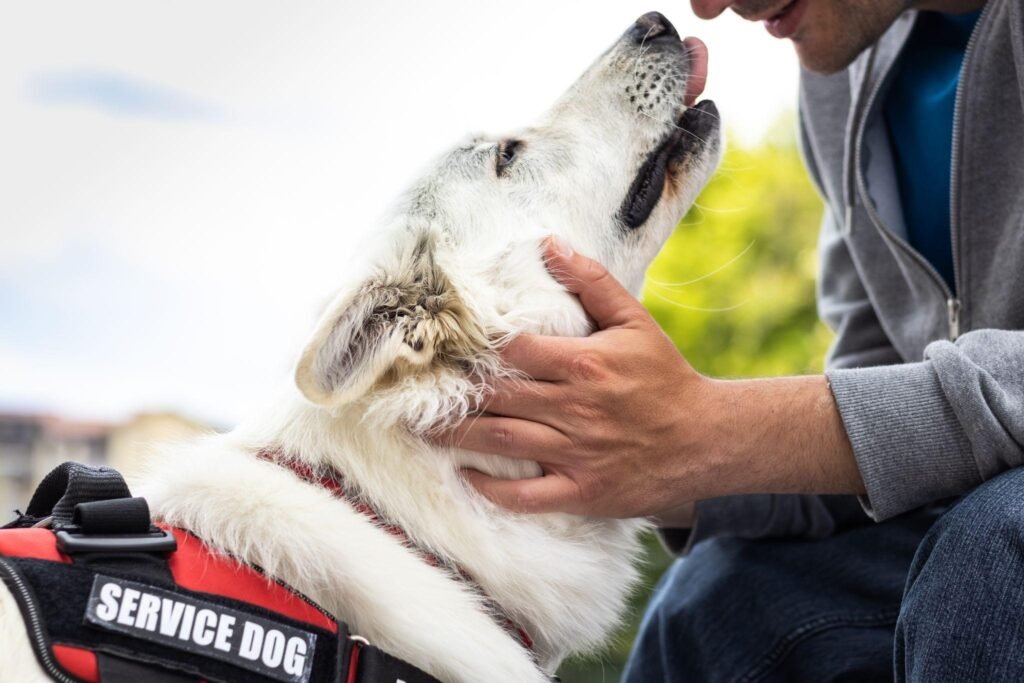
Emotional support animals (ESAs), service dogs, and therapy dogs are also useful companions for people who have disabilities. That said, it’s important to understand the differences between emotional support animals and service dogs. While the short answer is no, it’s not always that simple.
Different laws and provisions are in place to protect both types of dogs, so learning about what you can do with each specialized dog is essential if you want to avoid legal penalties.
The good news is that we’re here to help. Read on to learn more about emotional support animals and service dogs to further understand what makes them different.
What Is an Emotional Support Dog?
An Emotional support dog (ESD) is a canine companion that helps people with mental health conditions like anxiety, depression, bipolar disorder, and even post-traumatic stress disorder (PTSD). While an ESD will help people with these conditions, they don’t have the same protections as psychiatric service dogs or other types of service dogs.
That said, ESDs can remain in your home, even if they’re not pet-friendly because they’re protected under the Fair Housing Act (FHA). The act protects against landlords discriminating against people who have disabilities, and because an ESD is a form of treatment, you can keep your dog with you as long as they’re well-behaved and doesn’t damage the property.
All you need to have an emotional support dog is an ESA letter from a licensed mental health professional, and you’re good to go. Your landlord can ask for this document, so it’s important to get one.
Is an Emotional Support Dog a Service Dog?
No, emotional support dogs are not considered service animals. Service animals are protected under the Americans with Disabilities Act (ADA). Under this act, service dogs can live with you and travel in public without discrimination. Service dogs are also protected by the Air Carrier Access Act (ACAA), which allows your service dog to fly with you on airlines as long as you call ahead and follow the proper protocols.
These dogs have to go through special training to help people with disabilities perform a specific task.
Is an Emotional Support Dog a Therapy Dog?
No, emotional support dogs aren’t therapy animals. Therapy dogs are meant to calm down a crowd of people in places like nursing homes, hospitals, and schools, while ESDs are meant to be paired with one person. Most therapy dogs are also trained to some extent and have to be well-behaved in public spaces. Therapy dogs and ESDs do have the same legal protections, though, so you won’t see them out in public too often because they’re usually confined to their location.
How to Register a Psychiatric Service Dog
If you want an emotional support dog that can follow you anywhere, you’ll need to train them to be a service dog and have them registered specifically as a psychiatric service dog. These dogs can help in similar ways as an ESD but with the legal protections to go out in public.
The good news is that online organizations like US Service Animals can help you get started with a psychiatric service dog or any other type of service dog. You can provide some information about yourself and your dog and schedule a call with a licensed mental health professional. Once that’s done, you can adopt a trained service dog or go through the training process.
If you don’t have the time or money to train the dog, you might be better off with an emotional support animal. However, you can see if some organizations are providing free service dogs at this time.
Get the Help You Need from a Canine Companion Today!
Getting help with conditions like anxiety, depression, and other mental health disorders isn’t just about taking medication. Pairing your usual treatment routine with a psychiatric service dog or an emotional support dog can improve your symptoms and help you get back to living your best life.
Speak with a licensed therapist to see what type of dog you need, and make sure you provide a letter from your therapist to your landlord if you don’t live in pet-friendly housing; remember, you have protections under the Americans with Disabilities Act (ADA) and Fair Housing Act (FHA).



